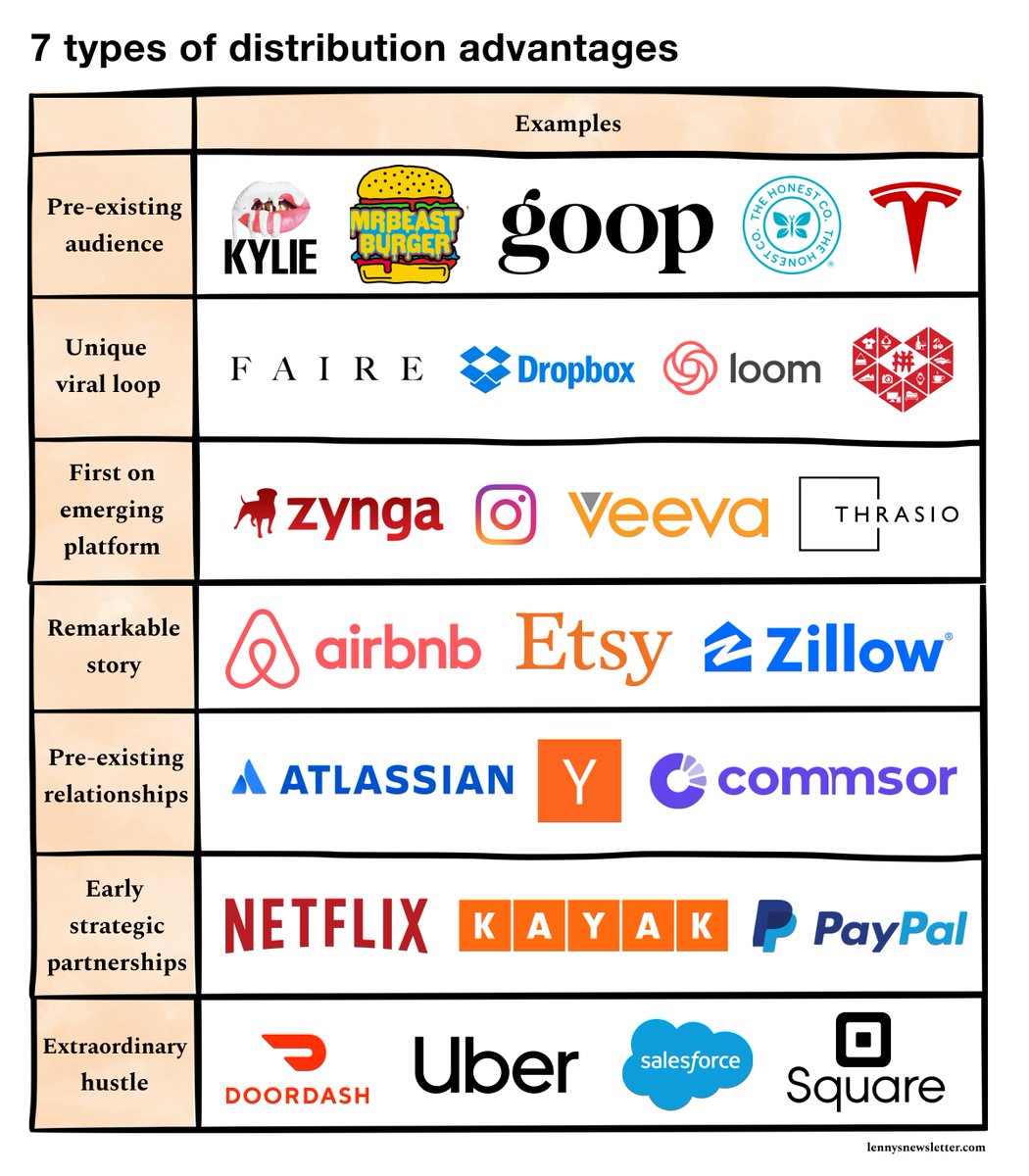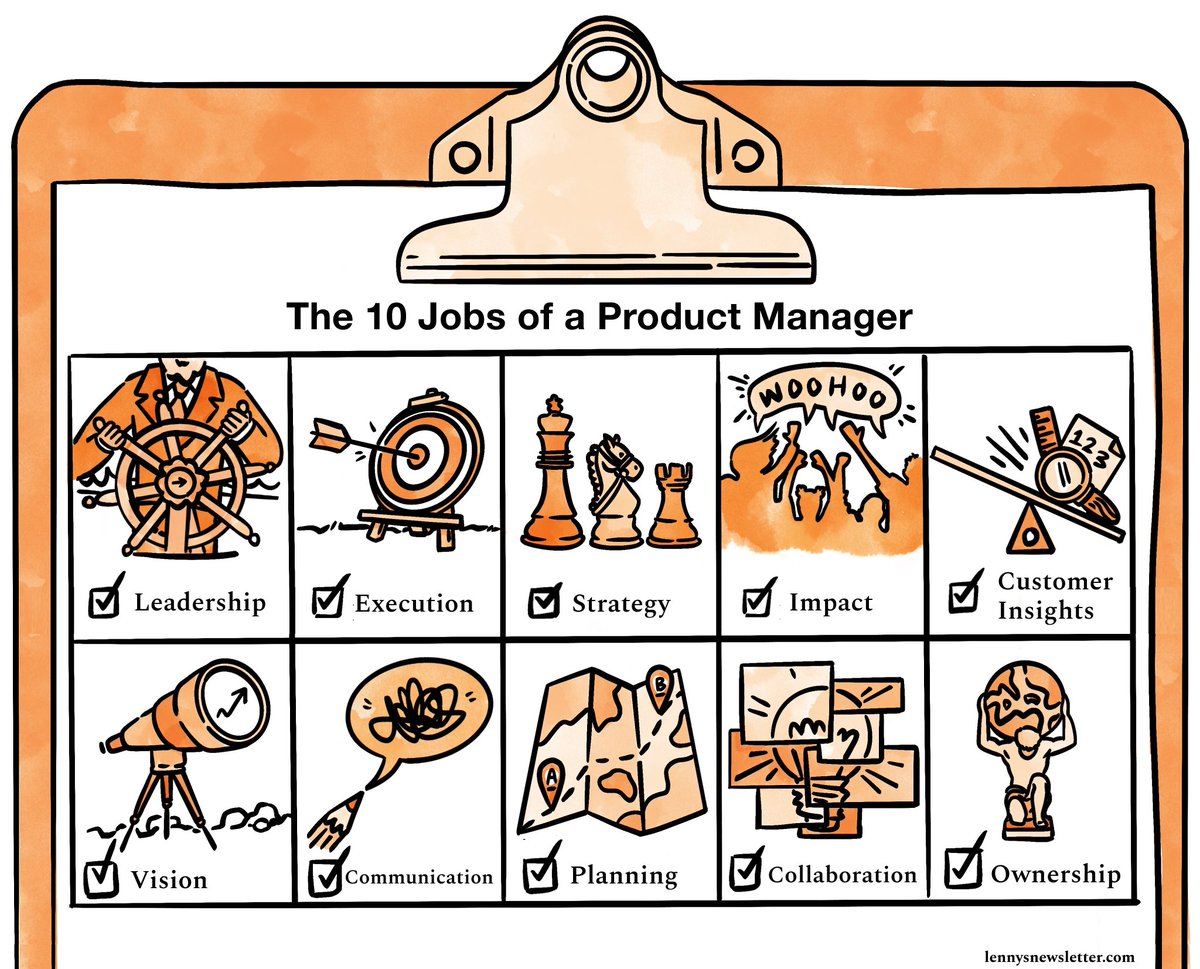
Labor marketplaces are exploding right now as people re-enter the workforce. But most quickly end up being supply constrained. I dug into how the fastest-growing labor marketplaces acquired their early supply (e.g. the people). Here's what I found 👇
lennysnewsletter.com/p/labor-market…
lennysnewsletter.com/p/labor-market…
2/ Labor marketplaces are especially interesting because instead of connecting people to products, they connect people to *people*. How cool!
Some examples: @The_Mom_Project @roo_vet @instawork @JoinIncredible @Shift @UsePared @ClipboardHealth @StaffyApp @thumbtack @Hired_HQ
Some examples: @The_Mom_Project @roo_vet @instawork @JoinIncredible @Shift @UsePared @ClipboardHealth @StaffyApp @thumbtack @Hired_HQ
3/ I found that there are primarily four ways these marketplaces kickstart their supply growth:
1. Job boards
Posting a generic role to an existing job board like Indeed, ZipRecruiter, or Craigslist. For example
1. Job boards
Posting a generic role to an existing job board like Indeed, ZipRecruiter, or Craigslist. For example

“Our customers tell us they use job boards when looking for work, so we go where our customers go: job boards (like Indeed). In the early days, we got a major portion of supply this way.” —Wei Deng, @ClipboardHealth
2. Targeted direct outreach
Cold outreach to strangers (or reconnecting with former colleagues) and convincing them to join.
Cold outreach to strangers (or reconnecting with former colleagues) and convincing them to join.
“We acquired most of our early Pros through direct outreach, often in person. For example, we would visit San Francisco restaurants in the morning and in the late evening, waiting outside the back door to recruit cooks, dishwashers, and servers." —@sumirmeghani, @instawork 

3. Word of mouth + paid referrals
Word of mouth, often with a referral program layered on top. Hard to engineer if your product doesn’t yet have strong product-market fit.
Word of mouth, often with a referral program layered on top. Hard to engineer if your product doesn’t yet have strong product-market fit.
“Word of mouth is huge in B2B labor marketplaces (i.e. a vet will tell his/her friends about Roo) so we ensure that the vet shift user experience on our platform is excellent, which helps to naturally have active vets tell other vets to try out Roo." —Lisa Hu, @roo_vet
4. Paid social
The final commonly-used growth channel turned out to be paid ads on social networks, particularly LinkedIn.
The final commonly-used growth channel turned out to be paid ads on social networks, particularly LinkedIn.
“We saw a lot of success with ads on LinkedIn, FB, and Google. Also niche podcasts and newsletters. Surprisingly effective and low CAC.” —@rmapes, @Hired_HQ
4/ Also, a bunch of other great ideas from the founders I spoke to:
💡 Upskill your supply
“We built cohort-based courses for transitioning service members (Navigating Next to figure out your goals with supportive peers) and experienced veterans (Career Accelerator to..."
💡 Upskill your supply
“We built cohort-based courses for transitioning service members (Navigating Next to figure out your goals with supportive peers) and experienced veterans (Career Accelerator to..."
"...focus on group interview prep and storytelling). These programs are talent magnets and allow us to ensure we’re only featuring ready-to-interview candidates who are actively on the market—which has become a major unique selling proposition.” —@MikeSlagh, @Shift
💡 First build a community
“For us, we started by building a community. We started as a meet-up like 6 years ago and then I kept running into issues in my own career in tech like sexual harassment and being underpaid etc, so at first I was like: I need to make my career safe..."
“For us, we started by building a community. We started as a meet-up like 6 years ago and then I kept running into issues in my own career in tech like sexual harassment and being underpaid etc, so at first I was like: I need to make my career safe..."
"... having an insanely good network of women who are going through the same things.
And then it grew to be a huge community, and this is back when every tech company said they had a pipeline problem, but we just kept growing, so we were like—we have the pipeline right here..."
And then it grew to be a huge community, and this is back when every tech company said they had a pipeline problem, but we just kept growing, so we were like—we have the pipeline right here..."
"Then we built the product for hiring from the community, which we’d been honing for 5 years.” —@techladyallison, @jointechladies
💡 Make certain there is demand
“We learned that to get the initial supply activated, we actually need to have some solid high-quality hospital shifts (demand) listed first to attract vet interest. So even before we recruit the supply, we get some demand drumming..."
“We learned that to get the initial supply activated, we actually need to have some solid high-quality hospital shifts (demand) listed first to attract vet interest. So even before we recruit the supply, we get some demand drumming..."
"... (setting strong messaging/expectations to hospitals that they may not see a lot of vet requests in the beginning). But they’re OK with that, as they’re used to having very little traction getting their shifts fulfilled from non-Roo methods.” —Lisa Hu, @roo_vet
💡 Press
“In the early days, we saw a lot of success pitching the stories of our users to press. When we launched the business, the @chicagotribune profiled a mom on our marketplace, Phoebe, who left her job at Google. Phoebe’s story resonated so strongly with so many women..."
“In the early days, we saw a lot of success pitching the stories of our users to press. When we launched the business, the @chicagotribune profiled a mom on our marketplace, Phoebe, who left her job at Google. Phoebe’s story resonated so strongly with so many women..."
"...and overnight we acquired thousands of users as this article became syndicated across other outlets and mom blogs, etc.” —@mrsrobinson_a, @The_Mom_Project
💡 Get the messaging right
“I learned from @JamesCurrier that everything starts with language. We set up landing pages and Facebook ads but didn’t do it randomly. We used the Wayback Machine and studied the messaging used by every known labor and non-labor marketplace …"
“I learned from @JamesCurrier that everything starts with language. We set up landing pages and Facebook ads but didn’t do it randomly. We used the Wayback Machine and studied the messaging used by every known labor and non-labor marketplace …"
...and tracked how the messaging changed over the years. So that helped make our first Facebook tests quite successful and cost-efficient: great messaging influenced by our predecessors.” —@ImanAbuzeid, @JoinIncredible
Huge thank you to @techladyallison, @mrsrobinson_a, @davelu , @ericvishria , @ImanAbuzeid, @jaimegetto, @MikeSlagh, @JustPeteTO, @RomeenSheth, @rmapes, @sholmesie, @sumirmeghani, Lisa Hu, and Wei Deng for contributing to this piece 🙏
For much more, don't miss the full post lennysnewsletter.com/p/labor-market…
• • •
Missing some Tweet in this thread? You can try to
force a refresh








